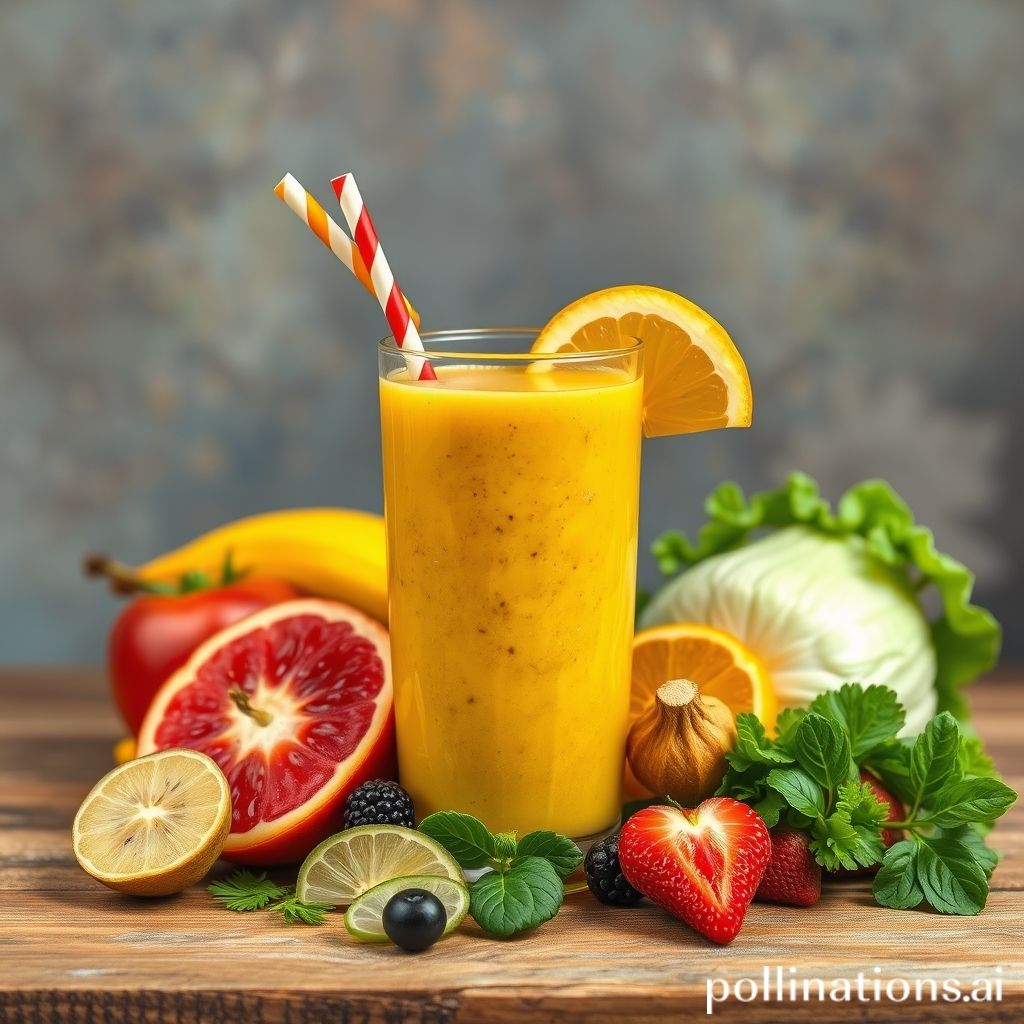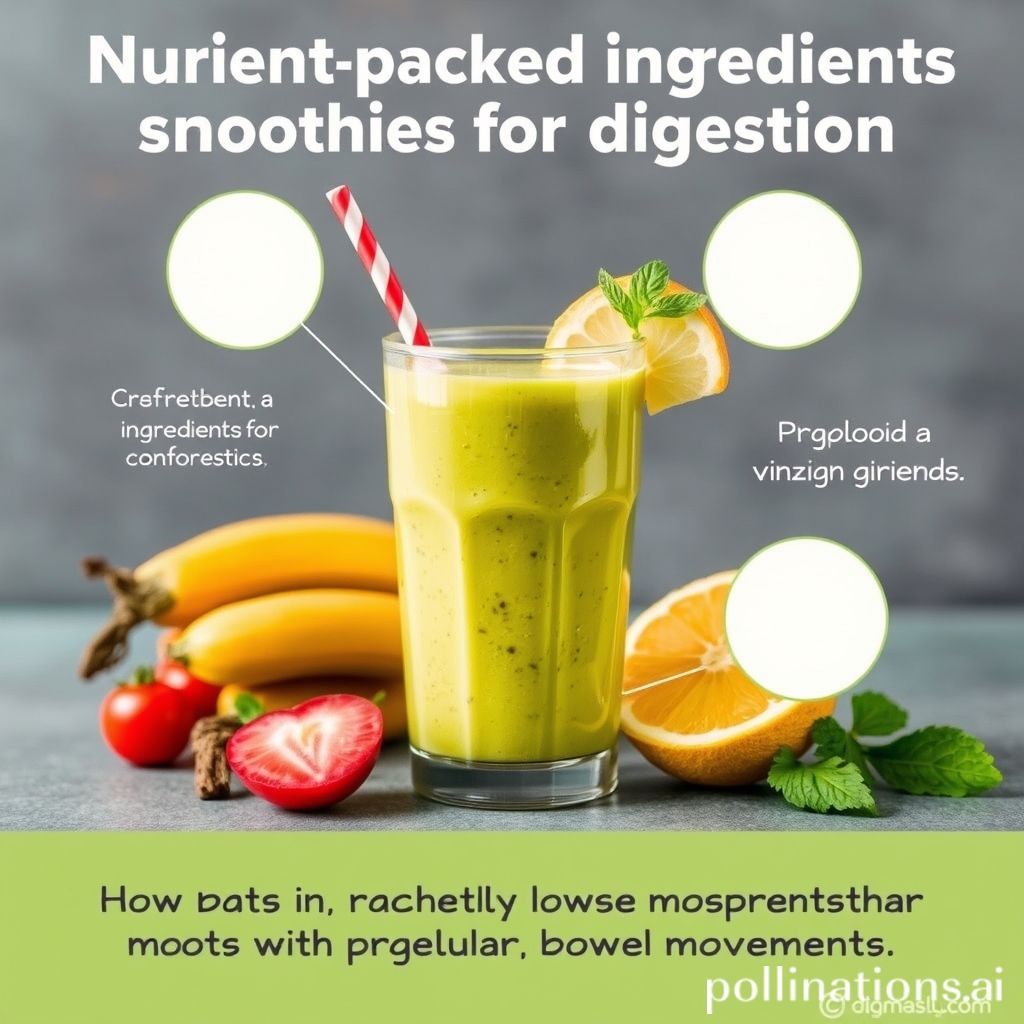Enhance Digestive Health with Nutrient-Packed Smoothies: A Natural Solution for Constipation
[su_note note_color=”#fb8e00″ text_color=”#000000″ radius=”12″]
Are smoothies the answer to your constipation woes? If you’re looking for a natural way to improve your digestive health, a daily smoothie might just be the solution you’ve been searching for. Packed with fiber-rich fruits and vegetables, these blended concoctions can help get things moving and alleviate constipation discomfort.
Whether you prefer a green smoothie packed with leafy greens or a fruity blend bursting with berries, incorporating smoothies into your diet can provide relief and improve your overall well-being. Say goodbye to the frustrating effects of constipation and say hello to a smoother, more comfortable digestive system with the power of a daily smoothie.
[su_box title=”
[/su_box]

Understanding Constipation and Its Causes
1. Definition of Constipation
Constipation is a common digestive issue characterized by infrequent or difficult bowel movements. It is typically associated with hard and dry stools, which can cause discomfort and straining during elimination. If a person experiences fewer than three bowel movements per week, it is often considered a sign of constipation.
2. Common Causes of Constipation
Several factors can contribute to the development of constipation. One common cause is a lack of fiber in the diet. Fiber plays a crucial role in promoting regular bowel movements. Insufficient fluid intake can also lead to constipation because it reduces the moisture content in the stool, making it harder to pass.
Other factors that may contribute to constipation include a sedentary lifestyle, certain medications such as painkillers and antacids, hormonal changes during pregnancy, and underlying medical conditions like irritable bowel syndrome (IBS) or hypothyroidism.
3. Importance of a Healthy Digestive System
A healthy digestive system is essential for overall well-being. It allows the body to effectively break down food, absorb nutrients, and eliminate waste products. When constipation occurs, it can disrupt this delicate balance and lead to discomfort and other health issues.
[su_highlight background=”#f6b40f”]Expert Tips: Eat a high-fiber diet, stay hydrated, exercise regularly, and manage stress to maintain a healthy digestive system.[/su_highlight]
The Role of Diet in Relieving Constipation
1. The Benefits of Fiber-Rich Foods
In order to maintain regular bowel movements and relieve constipation, it is important to include fiber-rich foods in your diet. Fiber adds bulk to your stool, making it easier to pass through your digestive system. Some examples of high-fiber foods include:
| Fruits | Vegetables | Whole Grains |
|---|---|---|
| Apples | Broccoli | Quinoa |
| Pears | Carrots | Brown rice |
| Berries | Spinach | Oatmeal |
2. The Importance of Hydration in Digestion
Staying hydrated is essential for maintaining proper digestive health and preventing constipation. When you are dehydrated, your body absorbs more water from the stool, resulting in dry and hard-to-pass stools. Make sure to drink enough fluids throughout the day, including water, herbal teas, and clear broths.
3. Nutritional Components for Digestive Health
In addition to fiber and hydration, certain nutritional components can contribute to better digestive health and alleviate constipation:
- Probiotics: These beneficial bacteria support a healthy gut and promote regular bowel movements. Yogurt, kefir, and fermented foods are excellent sources of probiotics.
- Magnesium: Adequate magnesium intake can help relax the muscles in your intestines and aid in bowel movements. Include foods like almonds, spinach, and avocados in your diet.
- Healthy Fats: Consuming healthy fats, such as those found in olive oil, nuts, and seeds, can lubricate the intestines and facilitate smoother bowel movements.
By focusing on a diet rich in fiber, staying hydrated, and incorporating nutritional components for digestive health, you can promote regularity and alleviate constipation naturally. Remember to consult with a healthcare professional for personalized advice.
Incorporating Smoothies into Your Diet for Constipation Relief
1. Nutrient-Packed Ingredients for Smoothies
If you want to relieve constipation, it’s important to include nutrient-packed ingredients in your smoothies. Here are some key ingredients you should consider:
- Fiber-rich fruits and vegetables: Add fruits like berries, apples, and bananas, as well as leafy greens like spinach or kale. These ingredients increase your fiber intake, which helps promote regular bowel movements.
- Chia seeds: These tiny seeds are rich in fiber and can help soften stools, making them easier to pass.
- Flaxseeds: Flaxseeds are similar to chia seeds in that they are high in fiber and can help relieve constipation.
2. Benefits of Smoothies for Digestion
Consuming smoothies can offer several benefits for your digestion, including:
- Hydration: Smoothies are a great way to stay hydrated, which is important for maintaining healthy bowel movements.
- Improved gut health: By including ingredients like yogurt or kefir, you introduce probiotics into your diet. These can enhance the balance of good bacteria in your gut and aid in digestion.
- Reduced inflammation: Adding ingredients like ginger or turmeric to your smoothies can help reduce inflammation in the digestive tract, promoting better digestion overall.
3. How Smoothies Can Promote Regular Bowel Movements
Smoothies can promote regular bowel movements by:
- Increasing fiber intake: As mentioned earlier, smoothies packed with fiber-rich fruits, vegetables, and seeds can add bulk to your stool and stimulate bowel movements.
- Providing hydration: Staying hydrated is crucial for keeping your stools soft and preventing constipation. Smoothies, with their high water content, contribute to your overall hydration levels.
- Supporting gut motility: Certain ingredients like aloe vera or ginger can stimulate the muscles in your digestive tract, promoting regular bowel movements.
To achieve the best results, it is recommended to consume smoothies as part of a well-balanced diet and to consult with a healthcare professional for personalized advice.

Best Smoothie Recipes for Constipation Relief
1. Fiber-rich Green Smoothie
A fiber-rich green smoothie is a great choice for relieving constipation and improving digestion. This smoothie combines leafy greens like spinach or kale with fruits such as apples or pears, providing a high amount of fiber.
2. Berry and Flaxseed Smoothie
Packed with antioxidants and omega-3 fatty acids, a berry and flaxseed smoothie can help alleviate constipation. Blend a mix of berries like blueberries, strawberries, and raspberries with a tablespoon of flaxseed for a delicious and nutritious smoothie.
3. Papaya and Ginger Smoothie
Papaya and ginger are both known for their digestive properties, making them a perfect combination for constipation relief. Blend ripe papaya chunks with a small piece of ginger and add a squeeze of lemon juice for a refreshing and soothing smoothie.
4. Prune and Spinach Smoothie
Prunes are widely recognized for their natural laxative effect, making them a perfect ingredient for combating constipation. Combine prunes with nutrient-rich spinach in a smoothie to create a tasty and effective solution for digestive issues.
5. Banana and Almond Butter Smoothie
Bananas are a great source of fiber and can help regulate bowel movements. Pair them with the healthy fats and protein from almond butter for a satisfying and constipation-relieving smoothie.
| Smoothie Recipe | Ingredients |
|---|---|
| Fiber-rich Green Smoothie | Spinach or kale, apples or pears, water or almond milk |
| Berry and Flaxseed Smoothie | Blueberries, strawberries, raspberries, flaxseed, water or coconut water |
| Papaya and Ginger Smoothie | Ripe papaya, ginger, lemon juice, water or pineapple juice |
| Prune and Spinach Smoothie | Prunes, spinach, almond milk, honey or sweetener of choice |
| Banana and Almond Butter Smoothie | Banana, almond butter, almond milk, honey or maple syrup |
These smoothie recipes are not only delicious but also packed with nutrients that can help relieve constipation and promote a healthy digestive system. Incorporate them into your regular diet to enjoy their benefits and improve your overall well-being.
[su_note note_color=”#ea2e0c” text_color=”#ffffff” radius=”8″]Extra Tips: Incorporate these fiber-rich smoothies into your daily routine to ease constipation and enhance digestion.[/su_note]
Tips for Maximizing the Digestive Benefits of Smoothies
1. Choose the Right Base for Your Smoothie
When making smoothies that aid digestion and relieve constipation, the choice of base is crucial. Opt for hydrating liquids that are gentle on the stomach, such as coconut water, aloe vera juice, or plain water. These bases not only keep you hydrated but also contribute to smoother bowel movements.
2. Add Fiber-Rich Fruits and Vegetables
Fiber is essential for promoting regular bowel movements and preventing constipation. Improve digestive health By coalescing fiber-rich fruits and vegetables into your smoothies. Consider adding ingredients like spinach, kale, berries, apples, pears, and chia seeds. These natural sources of fiber add bulk to your stool and help keep things moving smoothly.
3. Incorporate Probiotics for Gut Health
Probiotics are beneficial bacteria that support a healthy gut. Improve digestion and relieve constipation by including probiotic-rich ingredients in your smoothies. Yogurt, kefir, or plant-based alternatives like coconut milk yogurt are excellent choices. These ingredients introduce good bacteria into your digestive system, promoting a balanced gut flora and smoother bowel movements.
4. Avoid Ingredients That May Worsen Constipation
Meanwhile certain ingredients can aid digestion, others can worsen constipation. It is important to avoid ingredients that contribute to sluggish bowel movements. Some culprits include processed foods, refined sugars, dairy products (for those lactose intolerant), and low-fiber ingredients. Opt for whole, natural foods that are gentle on the digestive system.
Conclusion
Smoothies can be a helpful addition to a diet aimed at relieving constipation and improving digestive health. Packed with fiber, vitamins, and minerals, smoothies can promote regular bowel movements and ease the discomfort associated with constipation.
By encompassing ingredients like leafy greens, fruits, and high-fiber foods into your smoothie recipes, you can support a healthy digestive system. Nonetheless, it’s important to remember that smoothies should be part of a well-balanced diet that includes plenty of water and physical activity. If you’re experiencing chronic or severe constipation, it’s always best to consult with a healthcare professional for personalized advice.
Faq about Smoothies and Constipation
FAQ 1: Can smoothies cause constipation?
No, smoothies are unlikely to cause constipation. In fact, they can be beneficial for promoting regular bowel movements due to their high fiber content. Fiber helps add bulk to the stool and aids in its movement through the digestive system.
FAQ 2: How often should I drink smoothies for constipation relief?
It is recommended to consume smoothies regularly as part of a balanced diet for optimal digestive health. You can have them daily or a few times a week, depending on your preference and individual needs.
FAQ 3: Are there any side effects of consuming too many smoothies?
Whilst smoothies are generally considered safe, consuming excessive amounts may lead to certain side effects such as bloating or diarrhea. It’s important to ensure that your smoothies contain a balanced combination of fruits, vegetables, and other ingredients to avoid potential digestive issues.
FAQ 4: Can smoothies replace a balanced diet for digestive health?
Smoothies are a great addition to a balanced diet, but they should not replace it entirely. It’s important to incorporate a variety of foods from different food groups to ensure you are getting all the necessary nutrients for optimal digestive health.
FAQ 5: Are there any specific smoothies recommended for chronic constipation?
Yes, certain ingredients in smoothies can help alleviate chronic constipation. Adding fruits such as prunes, berries, or kiwi, which are high in fiber, can be beneficial. Additionally, incorporating leafy greens like spinach or kale can provide extra fiber and promote regular bowel movements.
